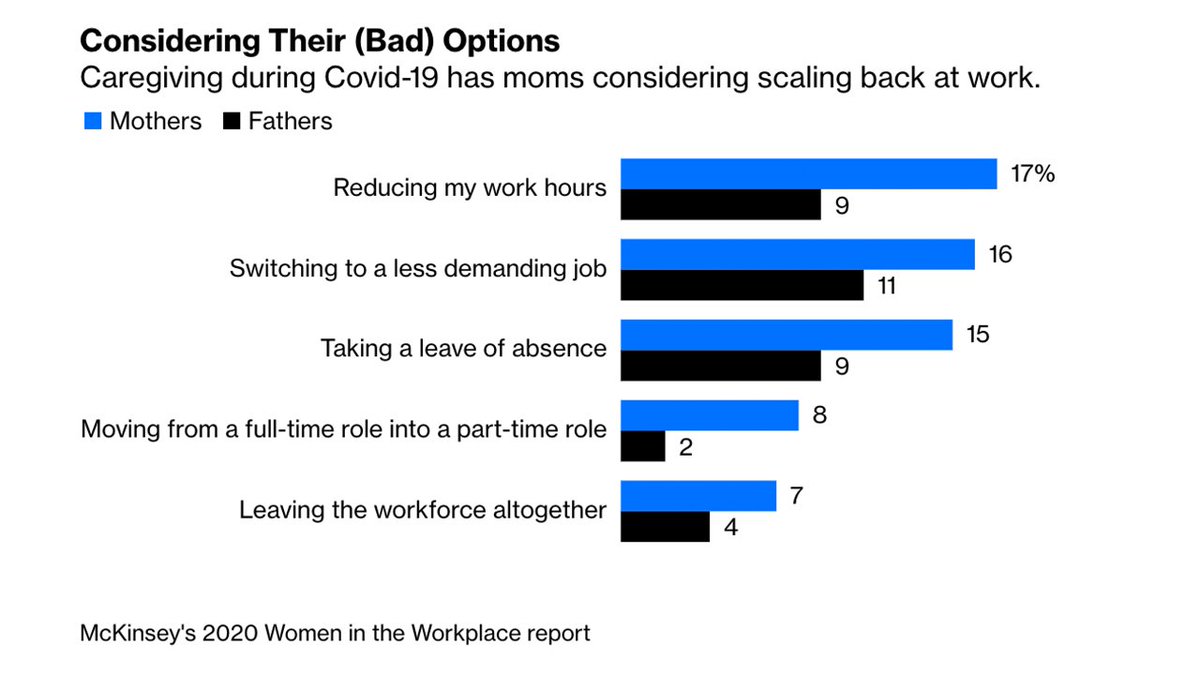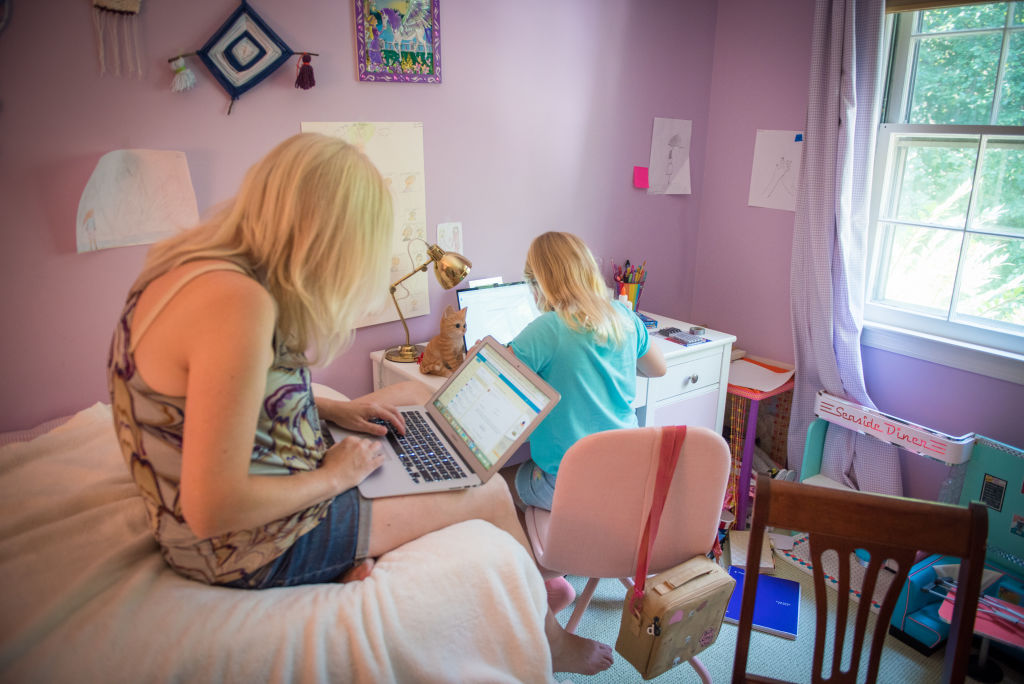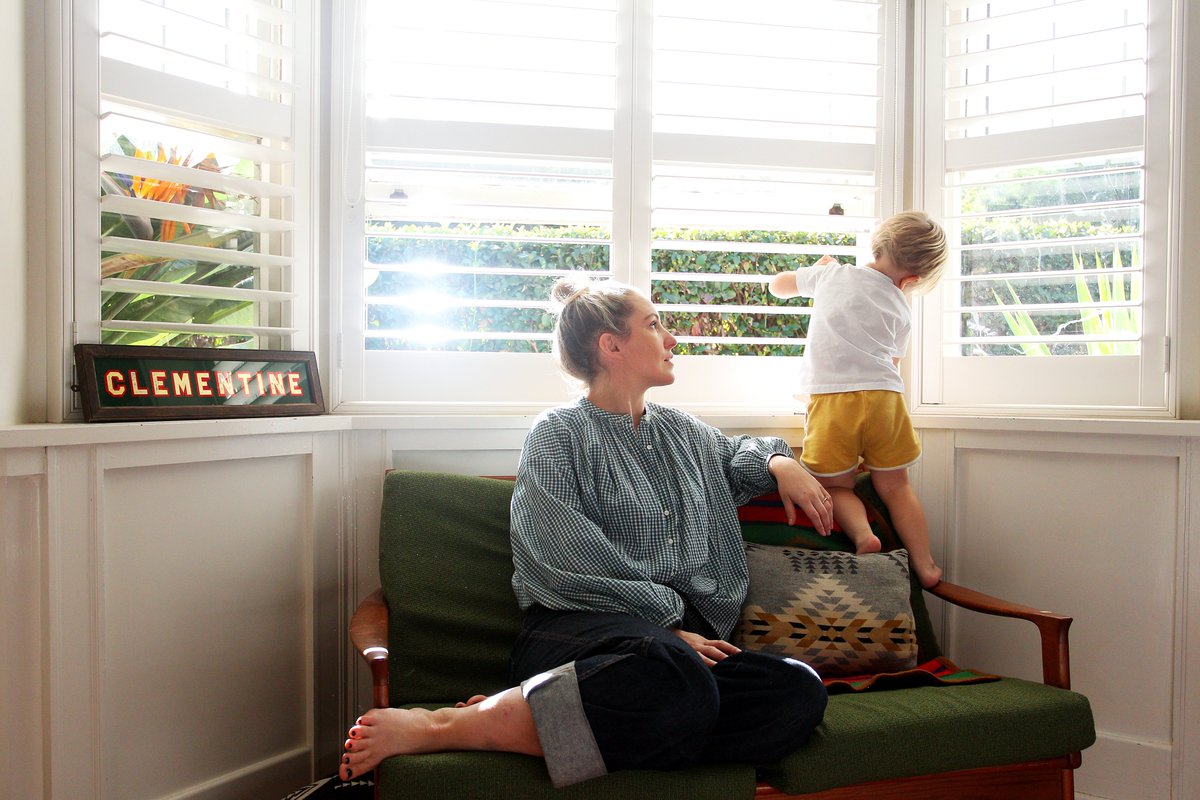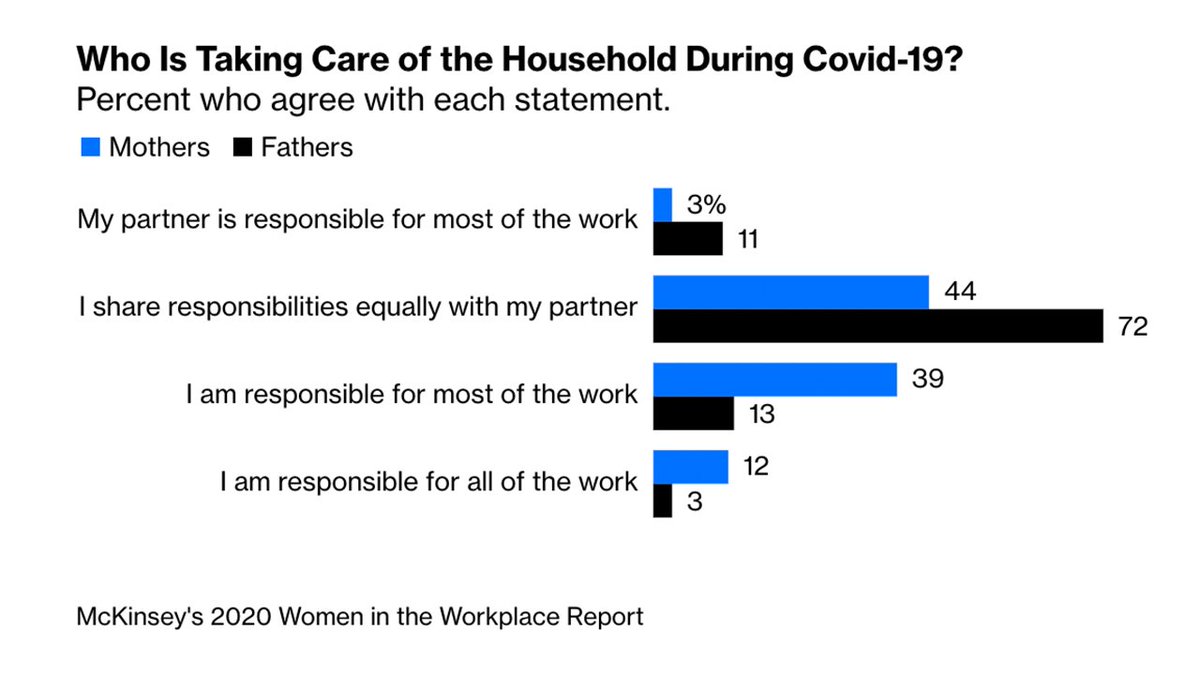In August and September, more than a million people dropped out of the workforce. 80% of them were women.
When women give up their careers, the choice is almost never truly a free one https://trib.al/NG9SUHn ">https://trib.al/NG9SUHn&q...
When women give up their careers, the choice is almost never truly a free one https://trib.al/NG9SUHn ">https://trib.al/NG9SUHn&q...
Mothers are juggling school closures and daycare chaos in addition to work. Husbands are pitching in, but not enough.
When women leave the workforce, they’re not exercising their options — they’ve run out of them. @JoanCWilliams and @skgreen discuss https://abs.twimg.com/emoji/v2/... draggable="false" alt="⬇️" title="Pfeil nach unten" aria-label="Emoji: Pfeil nach unten"> https://www.pscp.tv/bopinion/1DXGyAjrAjVGM?t=12s">https://www.pscp.tv/bopinion/...
https://abs.twimg.com/emoji/v2/... draggable="false" alt="⬇️" title="Pfeil nach unten" aria-label="Emoji: Pfeil nach unten"> https://www.pscp.tv/bopinion/1DXGyAjrAjVGM?t=12s">https://www.pscp.tv/bopinion/...
When women leave the workforce, they’re not exercising their options — they’ve run out of them. @JoanCWilliams and @skgreen discuss
One in 4 employed women (1 in 3 mothers) are considering quitting or dialing back at work.
This is the first time in six years of research that McKinsey has found any difference in men’s and women’s interest in quitting http://trib.al/NG9SUHn ">https://trib.al/NG9SUHn&q...
This is the first time in six years of research that McKinsey has found any difference in men’s and women’s interest in quitting http://trib.al/NG9SUHn ">https://trib.al/NG9SUHn&q...
Working parents are especially feeling the crunch.
A FlexJobs survey found that 25% of working fathers and mothers had reduced their hours to cope with child-care demands. But women were much more likely than men to quit http://trib.al/NG9SUHn ">https://trib.al/NG9SUHn&q...
A FlexJobs survey found that 25% of working fathers and mothers had reduced their hours to cope with child-care demands. But women were much more likely than men to quit http://trib.al/NG9SUHn ">https://trib.al/NG9SUHn&q...
What’s happening here is pretty obvious, and predictable: A lot of extra care work is falling on women and driving them out of the workforce.
This should signal the end of the “opt out” myth http://trib.al/NG9SUHn ">https://trib.al/NG9SUHn&q...
This should signal the end of the “opt out” myth http://trib.al/NG9SUHn ">https://trib.al/NG9SUHn&q...
Many people assume that women aren’t as frequently seen leading organizations or governments because so many of them “choose” to stay home.
In reality, the number of women who give up their careers is small http://trib.al/NG9SUHn ">https://trib.al/NG9SUHn&q...
In reality, the number of women who give up their careers is small http://trib.al/NG9SUHn ">https://trib.al/NG9SUHn&q...
The opt-out myth looms large in our culture.
A majority of people think that women “prioritizing family over work” is the primary barrier to women’s career advancement. In fact, only 11% of women are out of the workforce to care for children full time http://trib.al/NG9SUHn ">https://trib.al/NG9SUHn&q...
A majority of people think that women “prioritizing family over work” is the primary barrier to women’s career advancement. In fact, only 11% of women are out of the workforce to care for children full time http://trib.al/NG9SUHn ">https://trib.al/NG9SUHn&q...
Of Gen X women, only 28% had ever taken a break of six months or more to care for children.
That’s not enough to explain why there are so few women in the halls of power http://trib.al/NG9SUHn ">https://trib.al/NG9SUHn&q...
That’s not enough to explain why there are so few women in the halls of power http://trib.al/NG9SUHn ">https://trib.al/NG9SUHn&q...
While time away from work is often portrayed as a choice, the evidence shows that it’s usually a reluctant one. There are three external factors that steer women in this direction:
 https://abs.twimg.com/emoji/v2/... draggable="false" alt="➡️" title="Pfeil nach rechts" aria-label="Emoji: Pfeil nach rechts">Inflexible workplaces
https://abs.twimg.com/emoji/v2/... draggable="false" alt="➡️" title="Pfeil nach rechts" aria-label="Emoji: Pfeil nach rechts">Inflexible workplaces
 https://abs.twimg.com/emoji/v2/... draggable="false" alt="➡️" title="Pfeil nach rechts" aria-label="Emoji: Pfeil nach rechts">Oblivious husbands
https://abs.twimg.com/emoji/v2/... draggable="false" alt="➡️" title="Pfeil nach rechts" aria-label="Emoji: Pfeil nach rechts">Oblivious husbands
 https://abs.twimg.com/emoji/v2/... draggable="false" alt="➡️" title="Pfeil nach rechts" aria-label="Emoji: Pfeil nach rechts">Bad public policy
https://abs.twimg.com/emoji/v2/... draggable="false" alt="➡️" title="Pfeil nach rechts" aria-label="Emoji: Pfeil nach rechts">Bad public policy
http://trib.al/NG9SUHn ">https://trib.al/NG9SUHn&q...
http://trib.al/NG9SUHn ">https://trib.al/NG9SUHn&q...
The U.S. remains a country where only 19% of private-sector workers have paid family leave.
Many women are denied their post-baby accommodation requests. In professions such as law or finance, a plea to work 40 hrs/week is equivalent to going part time http://trib.al/NG9SUHn ">https://trib.al/NG9SUHn&q...
Many women are denied their post-baby accommodation requests. In professions such as law or finance, a plea to work 40 hrs/week is equivalent to going part time http://trib.al/NG9SUHn ">https://trib.al/NG9SUHn&q...
Another important factor is how much parenting fathers do, and how much work they do around the house.
Two-thirds of women who drop out of the workforce cite a lack of support from their husbands http://trib.al/NG9SUHn ">https://trib.al/NG9SUHn&q...
Two-thirds of women who drop out of the workforce cite a lack of support from their husbands http://trib.al/NG9SUHn ">https://trib.al/NG9SUHn&q...
Men don’t always realize how little they’re helping; time-use studies find that men overestimate how much housework they do http://trib.al/NG9SUHn ">https://trib.al/NG9SUHn&q...
Public policy also plays a role. The U.S. has always struggled in this department:
 https://abs.twimg.com/emoji/v2/... draggable="false" alt="🙅🏽♀️" title="Frau gestikuliert „Nicht OK“ (mittlerer Hautton)" aria-label="Emoji: Frau gestikuliert „Nicht OK“ (mittlerer Hautton)">Daycare isn’t affordable
https://abs.twimg.com/emoji/v2/... draggable="false" alt="🙅🏽♀️" title="Frau gestikuliert „Nicht OK“ (mittlerer Hautton)" aria-label="Emoji: Frau gestikuliert „Nicht OK“ (mittlerer Hautton)">Daycare isn’t affordable
 https://abs.twimg.com/emoji/v2/... draggable="false" alt="🤷🏻♂️" title="Achselzuckender Mann (heller Hautton)" aria-label="Emoji: Achselzuckender Mann (heller Hautton)">Paid leave is not guaranteed
https://abs.twimg.com/emoji/v2/... draggable="false" alt="🤷🏻♂️" title="Achselzuckender Mann (heller Hautton)" aria-label="Emoji: Achselzuckender Mann (heller Hautton)">Paid leave is not guaranteed
If the U.S. had paid maternity leave and affordable infant care, lots of women might never have quit their jobs http://trib.al/NG9SUHn ">https://trib.al/NG9SUHn&q...
If the U.S. had paid maternity leave and affordable infant care, lots of women might never have quit their jobs http://trib.al/NG9SUHn ">https://trib.al/NG9SUHn&q...

 Read on Twitter
Read on Twitter





 Inflexible workplaceshttps://abs.twimg.com/emoji/v2/... draggable="false" alt="➡️" title="Pfeil nach rechts" aria-label="Emoji: Pfeil nach rechts">Oblivious husbandshttps://abs.twimg.com/emoji/v2/... draggable="false" alt="➡️" title="Pfeil nach rechts" aria-label="Emoji: Pfeil nach rechts">Bad public policy https://trib.al/NG9SUHn&q..." title="While time away from work is often portrayed as a choice, the evidence shows that it’s usually a reluctant one. There are three external factors that steer women in this direction:https://abs.twimg.com/emoji/v2/... draggable="false" alt="➡️" title="Pfeil nach rechts" aria-label="Emoji: Pfeil nach rechts">Inflexible workplaceshttps://abs.twimg.com/emoji/v2/... draggable="false" alt="➡️" title="Pfeil nach rechts" aria-label="Emoji: Pfeil nach rechts">Oblivious husbandshttps://abs.twimg.com/emoji/v2/... draggable="false" alt="➡️" title="Pfeil nach rechts" aria-label="Emoji: Pfeil nach rechts">Bad public policy https://trib.al/NG9SUHn&q..." class="img-responsive" style="max-width:100%;"/>
Inflexible workplaceshttps://abs.twimg.com/emoji/v2/... draggable="false" alt="➡️" title="Pfeil nach rechts" aria-label="Emoji: Pfeil nach rechts">Oblivious husbandshttps://abs.twimg.com/emoji/v2/... draggable="false" alt="➡️" title="Pfeil nach rechts" aria-label="Emoji: Pfeil nach rechts">Bad public policy https://trib.al/NG9SUHn&q..." title="While time away from work is often portrayed as a choice, the evidence shows that it’s usually a reluctant one. There are three external factors that steer women in this direction:https://abs.twimg.com/emoji/v2/... draggable="false" alt="➡️" title="Pfeil nach rechts" aria-label="Emoji: Pfeil nach rechts">Inflexible workplaceshttps://abs.twimg.com/emoji/v2/... draggable="false" alt="➡️" title="Pfeil nach rechts" aria-label="Emoji: Pfeil nach rechts">Oblivious husbandshttps://abs.twimg.com/emoji/v2/... draggable="false" alt="➡️" title="Pfeil nach rechts" aria-label="Emoji: Pfeil nach rechts">Bad public policy https://trib.al/NG9SUHn&q..." class="img-responsive" style="max-width:100%;"/>




